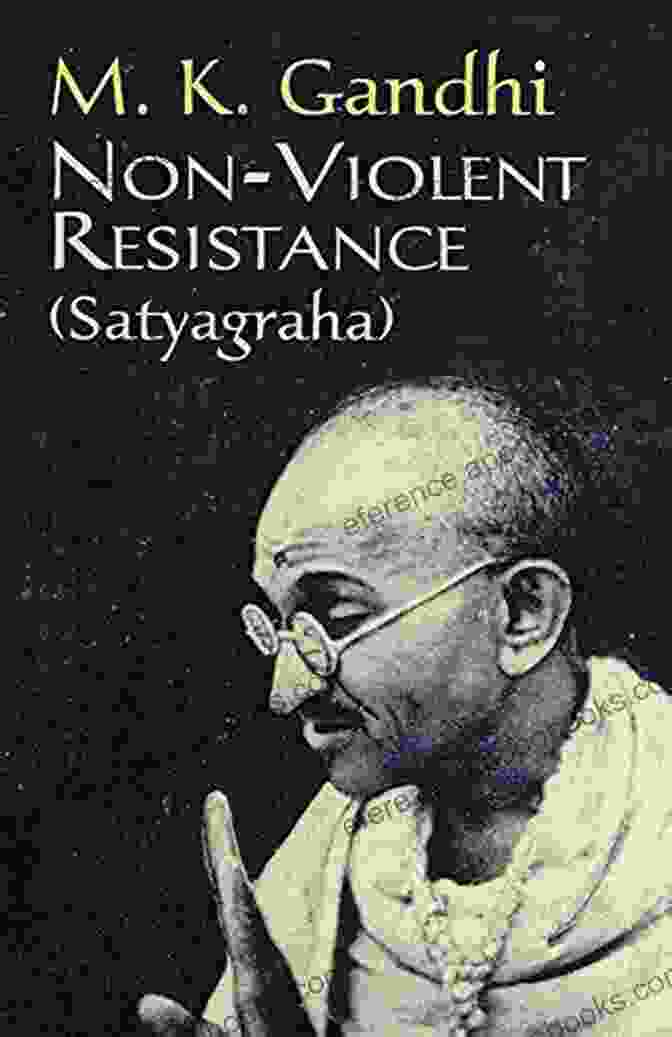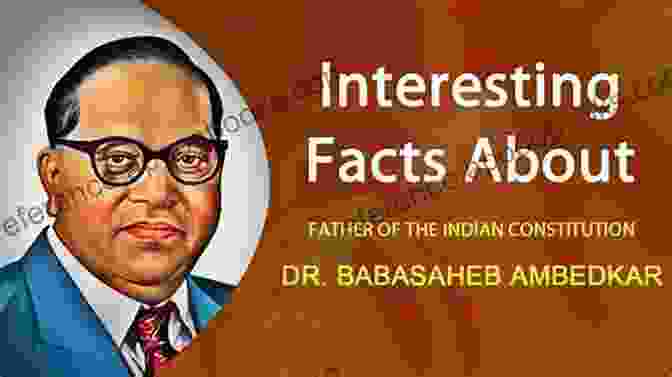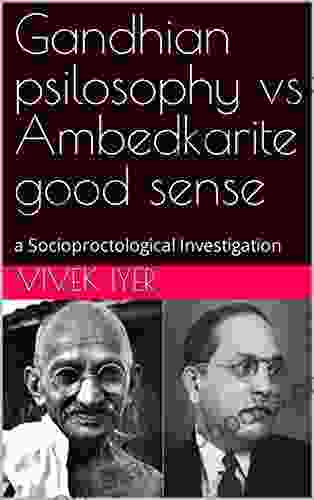Unveiling the Clash of Ideologies: Gandhian Philosophy vs. Ambedkarite Good Sense

5 out of 5
| Language | : | English |
| File size | : | 6966 KB |
| Text-to-Speech | : | Enabled |
| Screen Reader | : | Supported |
| Enhanced typesetting | : | Enabled |
| Word Wise | : | Enabled |
| Print length | : | 1316 pages |
| Lending | : | Enabled |
India's struggle for independence and its subsequent socio-political development was marked by the profound clash of two influential ideologies: Gandhian philosophy and Ambedkarite good sense. These ideologies, championed by Mahatma Gandhi and Dr. B.R. Ambedkar, respectively, represented contrasting perspectives on social justice, equality, and the path to India's progress. In this article, we delve into the core principles, historical contexts, and lasting impact of these ideologies, shedding light on the fundamental differences that shaped India's journey towards nationhood.
Gandhian Philosophy: Non-Violence and Satyagraha

Gandhian philosophy, rooted in the principles of non-violence (ahimsa) and civil disobedience (satyagraha),played a pivotal role in India's freedom struggle. Gandhi believed that violence and aggression were counterproductive and that the path to progress lay in peaceful resistance. He advocated for truth, compassion, and empathy, encouraging individuals to confront injustice through non-cooperation and civil disobedience.
Gandhi's philosophy emphasized the importance of self-reliance, communal harmony, and social upliftment. He believed in the innate goodness of humanity and sought to create a society based on justice, equality, and the eradication of caste discrimination. Gandhi's teachings left a lasting impression on India's political and social landscape, inspiring countless individuals to embrace non-violence and peaceful resistance.
Ambedkarite Good Sense: Social Justice and Equality

Ambedkarite good sense, articulated by Dr. B.R. Ambedkar, emerged as a critique of Gandhian philosophy and the prevailing caste system. Ambedkar, born into an Untouchable caste, experienced firsthand the horrors of discrimination and oppression faced by Dalits (formerly known as Untouchables). He rejected the Gandhian ideals of non-violence and gradual reform, arguing that these approaches were ineffective in addressing the systemic injustices faced by Dalits.
Ambedkarite good sense championed social justice and equality for all, irrespective of caste or background. He advocated for affirmative action policies, such as reservations in education and employment, to uplift marginalized communities. Ambedkar believed in the importance of education, political empowerment, and the eradication of untouchability to ensure the dignity and well-being of Dalits. His teachings ignited a movement for social justice, inspiring Dalits to fight against discrimination and assert their rights.
Clash of Ideologies: Key Differences
| Gandhian Philosophy | Ambedkarite Good Sense | |
|---|---|---|
| Approach to Social Justice | Gradual reform through non-violence and satyagraha | Affirmative action and direct confrontation of caste discrimination |
| View of Caste System | A remnant of the past, to be gradually eliminated through education and social change | An inherent evil that requires immediate eradication through legal and constitutional measures |
| Role of Religion | Inclusive and tolerant of all religions | Critical of religion, particularly Hinduism, for its role in perpetuating caste discrimination |
| Political Strategy | Peaceful resistance and civil disobedience | Political mobilization and assertion of Dalit rights |
These key differences highlight the fundamental clash between Gandhian philosophy and Ambedkarite good sense. Gandhi's emphasis on non-violence and gradual change stood in contrast to Ambedkar's belief in direct action and affirmative policies to address caste discrimination. While both ideologies aimed for a just and equitable society, their approaches and strategies were markedly different.
Impact on Indian Society
Both Gandhian philosophy and Ambedkarite good sense have had a profound impact on Indian society. Gandhi's teachings of non-violence and compassion have shaped the country's political culture, contributing to a peaceful transition to independence and inspiring countless individuals to work for social justice. Ambedkar's advocacy for social justice and equality has been instrumental in empowering Dalits and other marginalized communities, leading to the adoption of affirmative action policies and a greater awareness of caste discrimination.
The clash between these ideologies has also contributed to India's ongoing debates on social justice, equality, and the role of religion in society. Gandhian principles continue to be invoked by activists and politicians, while Ambedkarite thought remains a source of inspiration for those fighting against caste discrimination and systemic inequality.
The clash between Gandhian philosophy and Ambedkarite good sense represents a fundamental tension in India's socio-political landscape. Gandhi's emphasis on non-violence and gradual change stands in contrast to Ambedkar's call for affirmative action and direct confrontation of caste discrimination. While both ideologies were motivated by a desire for a just and equitable society, their approaches and strategies were fundamentally different. This clash has shaped India's journey towards nationhood, inspiring countless individuals to work for social justice and equality. As India continues to grapple with its complex social history, the legacy of these ideologies will continue to inform debates and shape the country's ongoing pursuit of a more just and inclusive society.
5 out of 5
| Language | : | English |
| File size | : | 6966 KB |
| Text-to-Speech | : | Enabled |
| Screen Reader | : | Supported |
| Enhanced typesetting | : | Enabled |
| Word Wise | : | Enabled |
| Print length | : | 1316 pages |
| Lending | : | Enabled |
Do you want to contribute by writing guest posts on this blog?
Please contact us and send us a resume of previous articles that you have written.
 Book
Book Novel
Novel Page
Page Chapter
Chapter Text
Text Story
Story Genre
Genre Reader
Reader Library
Library Paperback
Paperback E-book
E-book Magazine
Magazine Newspaper
Newspaper Paragraph
Paragraph Sentence
Sentence Bookmark
Bookmark Shelf
Shelf Glossary
Glossary Bibliography
Bibliography Foreword
Foreword Preface
Preface Synopsis
Synopsis Annotation
Annotation Footnote
Footnote Manuscript
Manuscript Scroll
Scroll Codex
Codex Tome
Tome Bestseller
Bestseller Classics
Classics Library card
Library card Narrative
Narrative Biography
Biography Autobiography
Autobiography Memoir
Memoir Reference
Reference Encyclopedia
Encyclopedia Aaron B Daniels
Aaron B Daniels C S Fuqua
C S Fuqua Charles Fisk
Charles Fisk Charles Bosworth
Charles Bosworth Shohreh Ghasemi
Shohreh Ghasemi Dominique Boyer
Dominique Boyer Cindy Heigl
Cindy Heigl Juliet Anderson
Juliet Anderson Terry Spring
Terry Spring John Perazzo
John Perazzo Thomas Thompson
Thomas Thompson Martin J Schwartz
Martin J Schwartz Dayna Lorentz
Dayna Lorentz Colin Carter
Colin Carter Adam Dodek
Adam Dodek Shabd Simon Alexander
Shabd Simon Alexander Elizabeth W Goldstein
Elizabeth W Goldstein Sergei Dovlatov
Sergei Dovlatov Rob Thomas
Rob Thomas Aaron Ross Powell
Aaron Ross Powell
Light bulbAdvertise smarter! Our strategic ad space ensures maximum exposure. Reserve your spot today!

 Pat MitchellUnveiling the Sentinels of Pennsylvania's Coal and Iron Industries: A Journey...
Pat MitchellUnveiling the Sentinels of Pennsylvania's Coal and Iron Industries: A Journey... Heath PowellFollow ·6.1k
Heath PowellFollow ·6.1k Leslie CarterFollow ·12.1k
Leslie CarterFollow ·12.1k Carlos FuentesFollow ·11.7k
Carlos FuentesFollow ·11.7k Russell MitchellFollow ·9k
Russell MitchellFollow ·9k Ernest ClineFollow ·4.9k
Ernest ClineFollow ·4.9k Dean ButlerFollow ·19.5k
Dean ButlerFollow ·19.5k Roberto BolañoFollow ·19.8k
Roberto BolañoFollow ·19.8k Austin FordFollow ·5.3k
Austin FordFollow ·5.3k

 Justin Bell
Justin BellUnlock National Biology Success: The Ultimate Guide to...
Mastering the Fundamentals: A Comprehensive...
 Luke Blair
Luke BlairAC/DC: The Early Years with Bon Scott – A Thunderstruck...
In the annals of rock and roll history, few...

 Darren Nelson
Darren NelsonSpinal Cord Medicine Second Edition: The Comprehensive...
The second edition of Spinal Cord Medicine...

 Cole Powell
Cole PowellArabian Horse Training: Unlock the Secrets for a...
Indulge in the captivating world of Arabian...

 Oscar Wilde
Oscar WildeRevise Curriculum For Excellence SQA Exams: The Ultimate...
The Scottish...

 David Peterson
David PetersonEndoscopic Ear Surgery: A Comprehensive Guide for...
Endoscopic Ear...
5 out of 5
| Language | : | English |
| File size | : | 6966 KB |
| Text-to-Speech | : | Enabled |
| Screen Reader | : | Supported |
| Enhanced typesetting | : | Enabled |
| Word Wise | : | Enabled |
| Print length | : | 1316 pages |
| Lending | : | Enabled |










